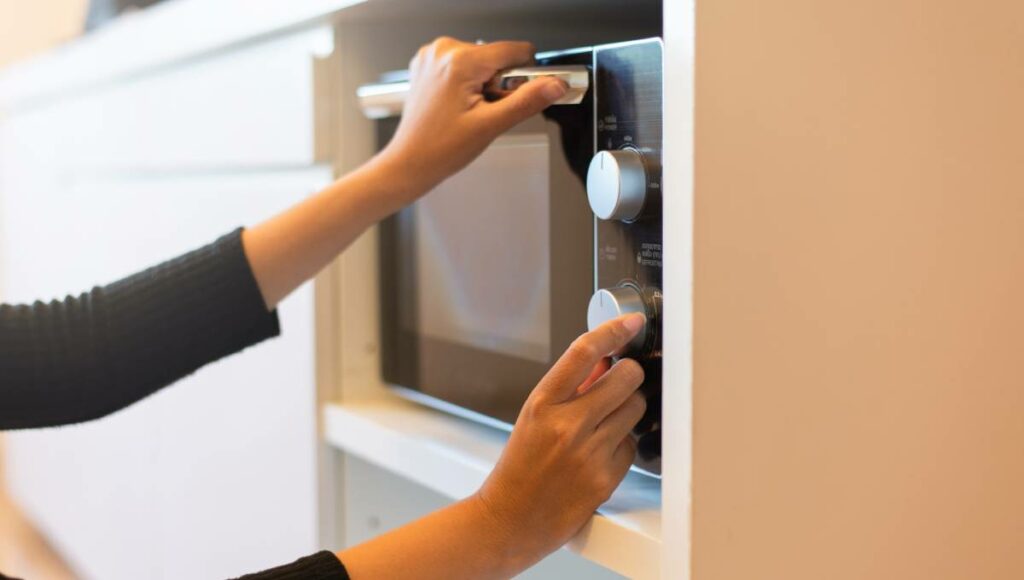Share the post "Is a 1000 Watt Microwave Good (and How It Compares to Other Wattages)"
Microwaves operate at a fairly large range of wattages. There are the lower-powered ones, which hover around 600-700 watts, and then the powerhouses, which sit at 1100-1200 watts. Shy of 200 watts from the top tier ones, is a 1000-watt microwave good?
A 1000-watt microwave is already a good microwave, especially for busy kitchens and large families. A 1000-watt microwave can do everything you want to do in a microwave efficiently and more quickly than microwaves with lower power.
Being 200 watts away from the highest wattage, a 1000-watt microwave will give you a lot of microwave power that many weaker microwaves may not be able to match. Aside from lower cooking times, the variety of foods you can reliably cook in the microwave increases, which may be a major concern for many people.

How Does a 1000-Watt Microwave Compare to Other Wattages?
Sitting at the high range, 1000-watt microwaves cook most food at a reasonably fast rate. Despite having 200 fewer watts than the highest tier of commercial microwaves, you’ll find that a 1000-watt microwave starts to have cooking time differences that don’t matter anymore.
Compared to lower wattages, especially those in the lowest range, a 1000-watt microwave will definitely be better. You can immediately feel the faster cooking times that can be cut off by more than 5 minutes on longer durations.
During busy mornings or cookouts with multiple meals, the cooking time shaved off from using the higher wattage quickly piles up. For visualization, a 20-minute meal on a 700-watt microwave drops down to 12-13 minutes on the 1000-watt one. 7 minutes can be truly crucial in many situations.
Additionally, the difference in cooking times increases as you go to even longer cooking times. An hour of cooking a meal at 700 watts drastically drops to 42 minutes at 1000 watts. You just cut off more than a quarter of the cooking time!
The amazing part about 1000-watt microwaves is that they have a high enough wattage that when you compare them to even higher-powered ones, the difference is negligible. You may only need to add around 3 minutes to longer durations of cooking.
For example, a 15-minute meal on a 1200-watt microwave only needs 3 minutes and 40 seconds more on a 1000-watt microwave. 15 minutes and 18 minutes effectively become the same amount of time in practice: it’s a difference, alright, but one that does not negatively impact your experience.
At even higher cooking times, the cooking time difference becomes larger, of course. An hour of cooking at 1200 watts needs to be compensated with 15 more minutes at 1000 watts.
At first, you might say that it’s basically the same difference as 700 watts vs 1000 watts. However, you need to consider that the food you’re cooking for 1 hour at 700 watts is not the same as the one you’re cooking at 1200 watts.
To cook the same meal that took you 1 hour on the 1000-watt microwave, you need 1 hour and 40 minutes on the 700-watt microwave. At this point, you can easily appreciate the middle ground that 1000-watt microwaves provide to home cooks.
Advantages of a 1000-Watt Microwave
Aside from faster cooking times, a 1000-watt microwave has more to offer that would greatly benefit home chefs and large families. First off, you can cook more types of food reliably with a 1000-watt microwave. This is, by far, one of the greatest advantages you can get.
Lower-wattage microwaves can be occasionally trusted with large meals. However, they will sometimes leave cold spots on thicker foods, where their wattage may not be strong enough to penetrate. With 1000 watts, you can cook most, if not all, meals on a recipe book evenly, efficiently, and with no problems.
Moreover, 1000-watt microwaves generally come with larger capacities. As they have a higher wattage, they do occupy a sizable volume in the kitchen, around 27 liters. This further enforces the idea of being able to cook large meals without worrying too much.
Lastly, 1000-watt microwaves often have power levels that you can adjust on their settings or knobs. This gives you the option to dial down to lower power levels if you don’t need the full 1000 watts. Things like simple reheating and boiling water can maximize this feature a lot.
If you have a large family but can’t afford the 1200-watt microwaves that might have been the perfect fit for you, the 1000-watt microwaves are a great compromise on price and features. The differences between 1200-watt microwaves and 1000-watt microwaves are often within acceptable bounds.
More often, 1000-watt microwaves are serviceable for everyone but those seriously using their microwaves on a frequent basis, like restaurants. Basic households would not want more with one.
Conclusion
Is a 1000-watt microwave good? For most people, it will be more than enough. It strikes a good balance between cooking times, price, and features so that you don’t feel like you’re losing out a lot. Additionally, they’re a great bump up when coming from lower-wattage microwaves.

